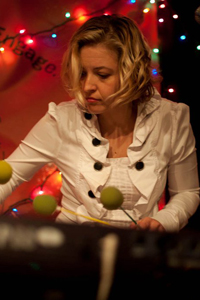
Gonzalo Plaza Photography
Vessela Stoyanova
For media inquiries, please contact Media Relations
A widely respected performer, composer, and educator, Vessela Stoyanova is a triple threat on the Boston music scene. Born and raised in Bulgaria, most of her original music is inspired by the folk music of the Balkans. Her compositions have been recorded by numerous ensembles and performed at major Boston-area venues, including the Berklee Performance Center, Jordan Hall, the Loeb Drama Center at the American Repertory Theater, as well as at many smaller venues around the United States and Europe.
As a performer, Vessela combines virtuosic mallet technique with the world of electronics, especially via her prototype instrument the Marimba Lumina—a sophisticated mallet MIDI controller. Currently she performs and writes for two projects: Bury Me Standing (a gypsy dirge-core band) and Goli (a modern chamber music duo), both of which she cofounded. Vessela recently joined the Jazz Composers Alliance and has been a featured soloist for a number of their concerts.
Vessela holds a master’s degree in contemporary improvisation from the New England Conservatory of Music. She is a faculty member at Berklee College of Music, where she teaches Harmony and Marimba during the regular school year, and a Balkan ensemble during the Five-Week Summer Performance Program.
- Cofounder, cocomposer, and marimba player for Bury Me Standing, an ensemble that mixes Balkan folk music, thrash metal, and psychedelic avant-pop
- Cofounder, cocomposer, marimba/melodica player, and second vocalist for GOLI, a duet playing chamber music for the modern era
- Cofounder, band leader, composer, and MIDI marimba player for Fluttr Effect, an eclectic art-rock band. More than 500 concerts, touring the U.S., Canada, and Europe, including major summer festivals
- Cofounder, band leader, composer, and marimba player for .WAV, a surf-jazz fusion band. More than 200 concerts in the U.S. and Canada
- Cofounder, composer, arranger, marimba/melodica player, and back-up vocalist for Elephant Tango Ensemble, featuring original puppetry in combination with live music
- Marimba and glockenspiel player for Emperor Norton’s Stationary Marching Band, an outfit that combines the musical histories of the circus and the vagabond peoples of Europe with the irreverence of today's vaudeville
- Event curator and promoter at Cloud Club Music Series, an artist collective dedicated to hosting unique concerts and multimedia performances for local and visiting artists
- Member of house band for Bent Wit Cabaret
- Freelance composer, performer, and recording artist with the American Repertory Theater, the Berklee Rainbow Band, Jaggery, Birdsongs of the Mesozoic, Sarah Rabdau, Tufts University, and New England Conservatory
- Winner, first prize, Festival of Bulgarian Culture, 2000 (as member of .WAV)
- Winner, U.S. finals of Emergenza International Music Contest, 2004 (as member of Fluttr Effect)
